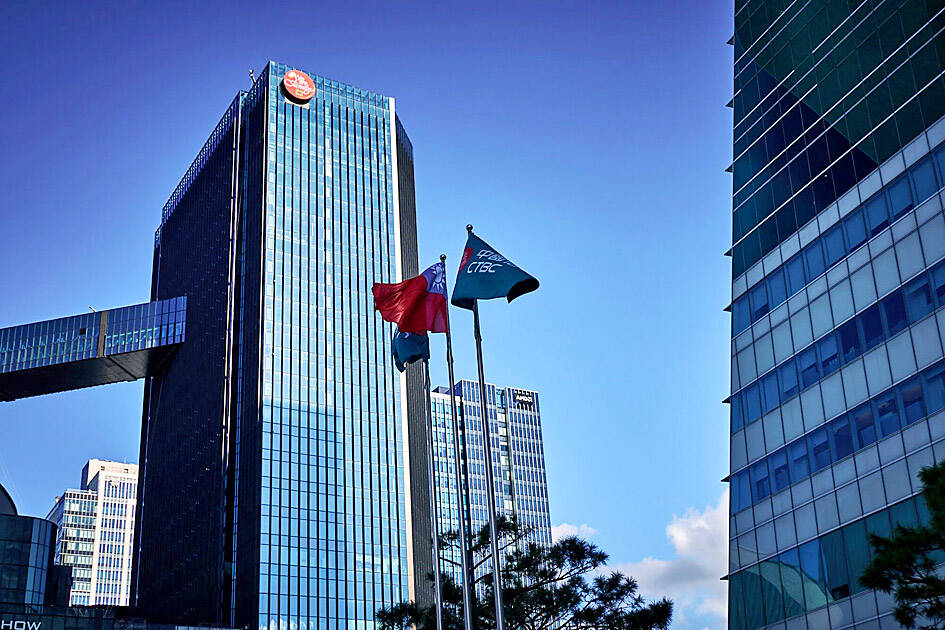CTBC Financial Holding Co (中信金控) yesterday officially aborted its bid to acquire Shin Kong Financial Holding Co (新光金控) after the Financial Supervisory Commission made clear its objections to the takeover.
The nation’s third-largest financial conglomerate announced the pullback in a stock exchange filing, nixing a month-long attempt to buy Shin Kong Financial through a public tender offer and share swaps totaling NT$14.55 per share.
The offer is higher than the NT$14.18 per share which Taishin Financial Holding Co (台新金控) proposed in its bid to merge with Shin Kong Financial through full share swaps earlier this month.

Photo: An Rong Xu, Bloomberg
“We have decided to halt investment [in Shin Kong Financial] in line with the Financial Supervisory Commission’s decision on the matter,” the filing said.
FUNDING ISSUES
The commission on Monday said it had reservations about the buyout attempt due to concerns that CTBC Financial intended to buy 51 percent of Shin Kong Financial shares on the open market and via share swaps.
The venture lacked details about how CTBC Financial would secure the necessary funding and what it would do with Shin Kong Financial shares if the buyout failed, the commission said at the time.
CTBC Financial also failed to commit to capital increases for Shin Kong Life Insurance Co (新光人壽) and displayed a lack of understanding about the financial state of the main subsidiary of Shin Kong Financial, the commission said.
The regulator said that companies usually use all-cash advances in hostile takeover bids and set the share purchase target to higher than 80 percent to avoid management rights disputes.
COMMISSION ANGERED
On Tuesday, CTBC Financial responded by indicating that it would call a board meeting later yesterday and revise buyout terms to clarify any misunderstandings.
However, that angered the commission, which on Thursday said that it disliked any moves that would upset or destabilize the financial markets and suggested that CTBC Financial should drop the effort.
CTBC Financial unveiled its investment plan after Taishin Financial and Shin Kong Financial reached a merger agreement after long discussions, the commission said, adding that the Shin Kong Financial share price has been volatile recently.
The two conglomerates would call shareholder meetings on Oct. 9 to vote on the merger and then seek regulatory approval from the commission.

When an apartment comes up for rent in Germany’s big cities, hundreds of prospective tenants often queue down the street to view it, but the acute shortage of affordable housing is getting scant attention ahead of today’s snap general election. “Housing is one of the main problems for people, but nobody talks about it, nobody takes it seriously,” said Andreas Ibel, president of Build Europe, an association representing housing developers. Migration and the sluggish economy top the list of voters’ concerns, but analysts say housing policy fails to break through as returns on investment take time to register, making the

‘SILVER LINING’: Although the news caused TSMC to fall on the local market, an analyst said that as tariffs are not set to go into effect until April, there is still time for negotiations US President Donald Trump on Tuesday said that he would likely impose tariffs on semiconductor, automobile and pharmaceutical imports of about 25 percent, with an announcement coming as soon as April 2 in a move that would represent a dramatic widening of the US leader’s trade war. “I probably will tell you that on April 2, but it’ll be in the neighborhood of 25 percent,” Trump told reporters at his Mar-a-Lago club when asked about his plan for auto tariffs. Asked about similar levies on pharmaceutical drugs and semiconductors, the president said that “it’ll be 25 percent and higher, and it’ll

NOT TO WORRY: Some people are concerned funds might continue moving out of the country, but the central bank said financial account outflows are not unusual in Taiwan Taiwan’s outbound investments hit a new high last year due to investments made by contract chipmaker Taiwan Semiconductor Manufacturing Co (TSMC, 台積電) and other major manufacturers to boost global expansion, the central bank said on Thursday. The net increase in outbound investments last year reached a record US$21.05 billion, while the net increase in outbound investments by Taiwanese residents reached a record US$31.98 billion, central bank data showed. Chen Fei-wen (陳斐紋), deputy director of the central bank’s Department of Economic Research, said the increase was largely due to TSMC’s efforts to expand production in the US and Japan. Investments by Vanguard International

WARNING SHOT: The US president has threatened to impose 25 percent tariffs on all imported vehicles, and similar or higher duties on pharmaceuticals and semiconductors US President Donald Trump on Wednesday suggested that a trade deal with China was “possible” — a key target in the US leader’s tariffs policy. The US in 2020 had already agreed to “a great trade deal with China” and a new deal was “possible,” Trump said. Trump said he expected Chinese President Xi Jinping (習近平) to visit the US, without giving a timeline for his trip. Trump also said that he was talking to China about TikTok, as the US seeks to broker a sale of the popular app owned by Chinese firm ByteDance Ltd (字節跳動). Trump last week said that he had